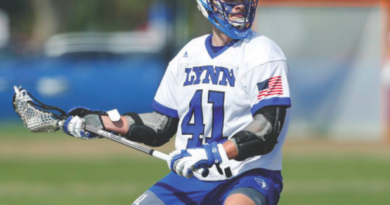Honoring Tradition And Remembering The Past
BY BENJAMIN LESCHINS
Staff Writer
In commemoration of Holocaust Remembrance Day, I would like to take a trip down memory lane to a very impactful event this past February which reminded me of the importance of honoring tradition. One of the main themes of Judaism is tradition. Whether it be sitting at a Shabbat table or being in synagogue, tradition has always been an integral part of my life. More so in Judaism is the importance of being made aware of and having a conscience of tradition. This is why I was very excited to go to the Next Generations event at Lynn recently.
The event in question was sponsored in part by Hillel, the Law and Justice Club, and Next Generations, an organization of second generation Holocaust survivors that provides survivors and their families the chance to share their stories through various speaking engagements at schools, universities, and synagogues. The organization’s goal is to make sure that the current and future generations never forget the tragedy of the Holocaust.
The Holocaust happened nearly 80 years ago, and because of the time that has passed many of the survivors have since passed away. According to the United States Holocaust Memorial Museum, their registry contains the names of approximately 195,000 survivors as of fifteen years ago. They say that many of them are deceased. It is because of this that testimonials of Holocaust horror stories are becoming so hard to come by.
Although I did not have any immediate family in the Holocaust, I did have the mother of a family friend who was a survivor after being sent to Auschwitz. I have vivid memories of her telling me stories of when she was a child in the Holocaust and that she had lost her entire family. She also showed me the numbers on her arm that so many others had as well. She passed away a few years ago.
Eva Kor, 82, was the night’s speaker and it was particularly notable for me. Even though no two Holocaust stories are the same, Kor’s was an exception because it was a story like I’ve never heard before. She was part of a set of 1,500 twins that were subjected to horrific medical experimentation under the supervision of Dr. Josef Mengele. Among these experimentations were injections of foreign substances after having her arms tied so tightly that her blood circulation was cut off.
More surprising than the fact that she and her twin sister survived the Holocaust was that, as time passed on, Kor has learned to forgive the Nazis and Germany as a whole for the devastation that she, her twin sister, and millions of others had faced. It takes an unbelievably strong person to be able to forgive for something seemingly unimaginable.
Having Kor speak at Lynn allowed me to reinforce my belief in the significance of tradition in my personal and religious life. I was glad to be able to hear yet another captivating first hand testimony from a survivor. Tradition is very much alive in our generation and to those who of us who care, we incorporate the tradition of remembering the Holocaust. At the end of the day, whether we choose to accept it or not, tradition plays a deep role in our lives because it is a part of who we are. Tradition is our gateway to the past. We are able to learn from our past in order to make improvements as a society, and ultimately to never forget.
In commemoration of Holocaust Remembrance Day, I would like to take a trip down memory lane to a very impactful event this past February which reminded me of the importance of honoring tradition. One of the main themes of Judaism is tradition. Whether it be sitting at a Shabbat table or being in synagogue, tradition has always been an integral part of my life. More so in Judaism is the importance of being made aware of and having a conscience of tradition. This is why I was very excited to go to the Next Generations event at Lynn recently.
The event in question was sponsored in part by Hillel, the Law and Justice Club, and Next Generations, an organization of second generation Holocaust survivors that provides survivors and their families the chance to share their stories through various speaking engagements at schools, universities, and synagogues. The organization’s goal is to make sure that the current and future generations never forget the tragedy of the Holocaust.
The Holocaust happened nearly 80 years ago, and because of the time that has passed many of the survivors have since passed away. According to the United States Holocaust Memorial Museum, their registry contains the names of approximately 195,000 survivors as of fifteen years ago. They say that many of them are deceased. It is because of this that testimonials of Holocaust horror stories are becoming so hard to come by.
Although I did not have any immediate family in the Holocaust, I did have the mother of a family friend who was a survivor after being sent to Auschwitz. I have vivid memories of her telling me stories of when she was a child in the Holocaust and that she had lost her entire family. She also showed me the numbers on her arm that so many others had as well. She passed away a few years ago.
Eva Kor, 82, was the night’s speaker and it was particularly notable for me. Even though no two Holocaust stories are the same, Kor’s was an exception because it was a story like I’ve never heard before. She was part of a set of 1,500 twins that were subjected to horrific medical experimentation under the supervision of Dr. Josef Mengele. Among these experimentations were injections of foreign substances after having her arms tied so tightly that her blood circulation was cut off.
More surprising than the fact that she and her twin sister survived the Holocaust was that, as time passed on, Kor has learned to forgive the Nazis and Germany as a whole for the devastation that she, her twin sister, and millions of others had faced. It takes an unbelievably strong person to be able to forgive for something seemingly unimaginable.
Having Kor speak at Lynn allowed me to reinforce my belief in the significance of tradition in my personal and religious life. I was glad to be able to hear yet another captivating first hand testimony from a survivor. Tradition is very much alive in our generation and to those who of us who care, we incorporate the tradition of remembering the Holocaust. At the end of the day, whether we choose to accept it or not, tradition plays a deep role in our lives because it is a part of who we are. Tradition is our gateway to the past. We are able to learn from our past in order to make improvements as a society, and ultimately to never forget.




